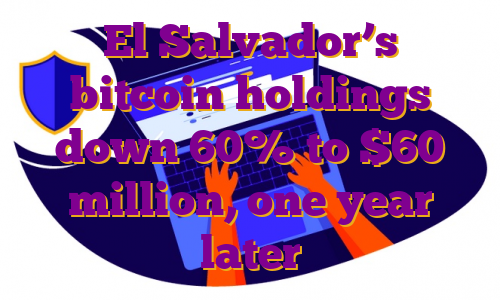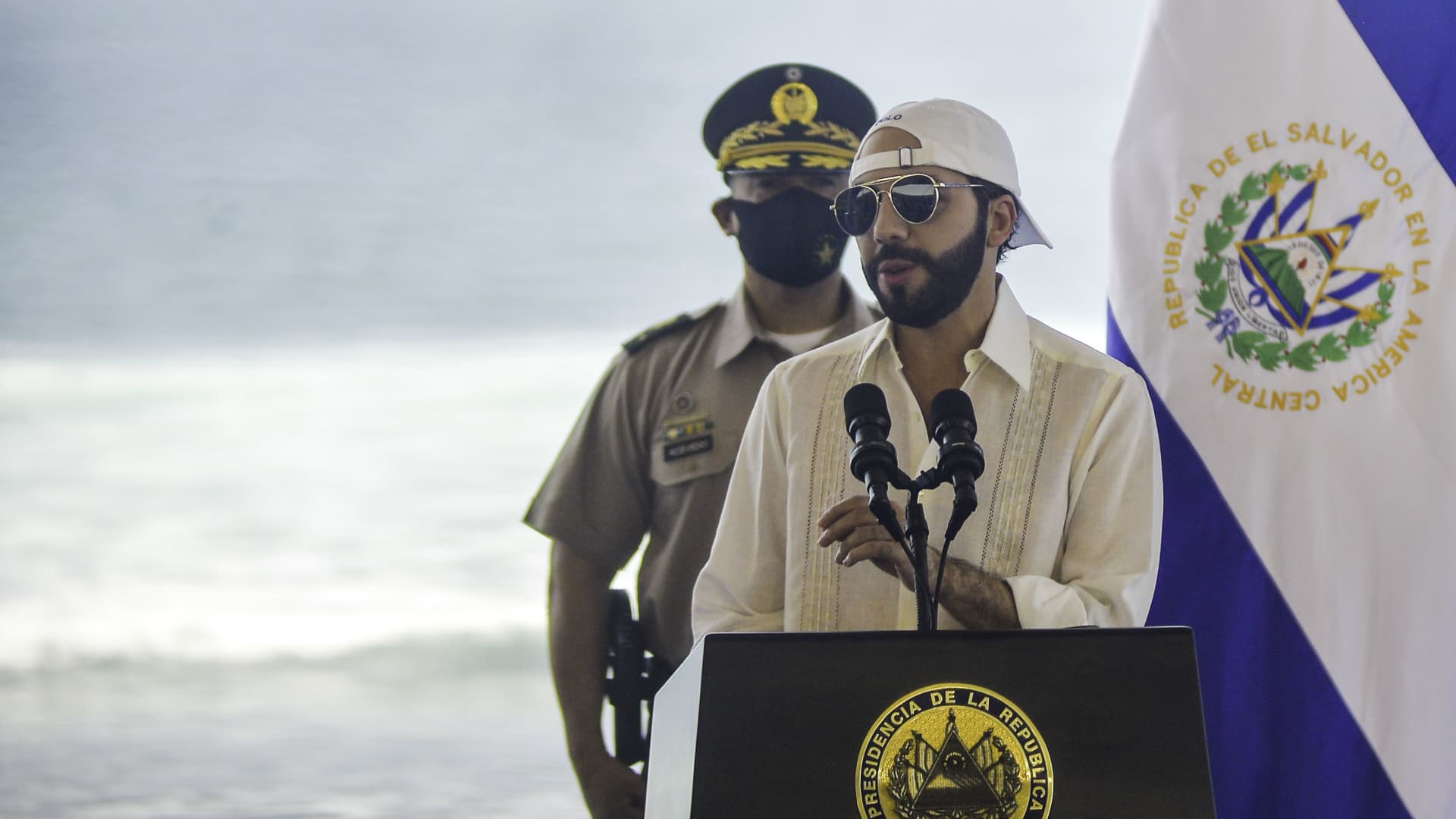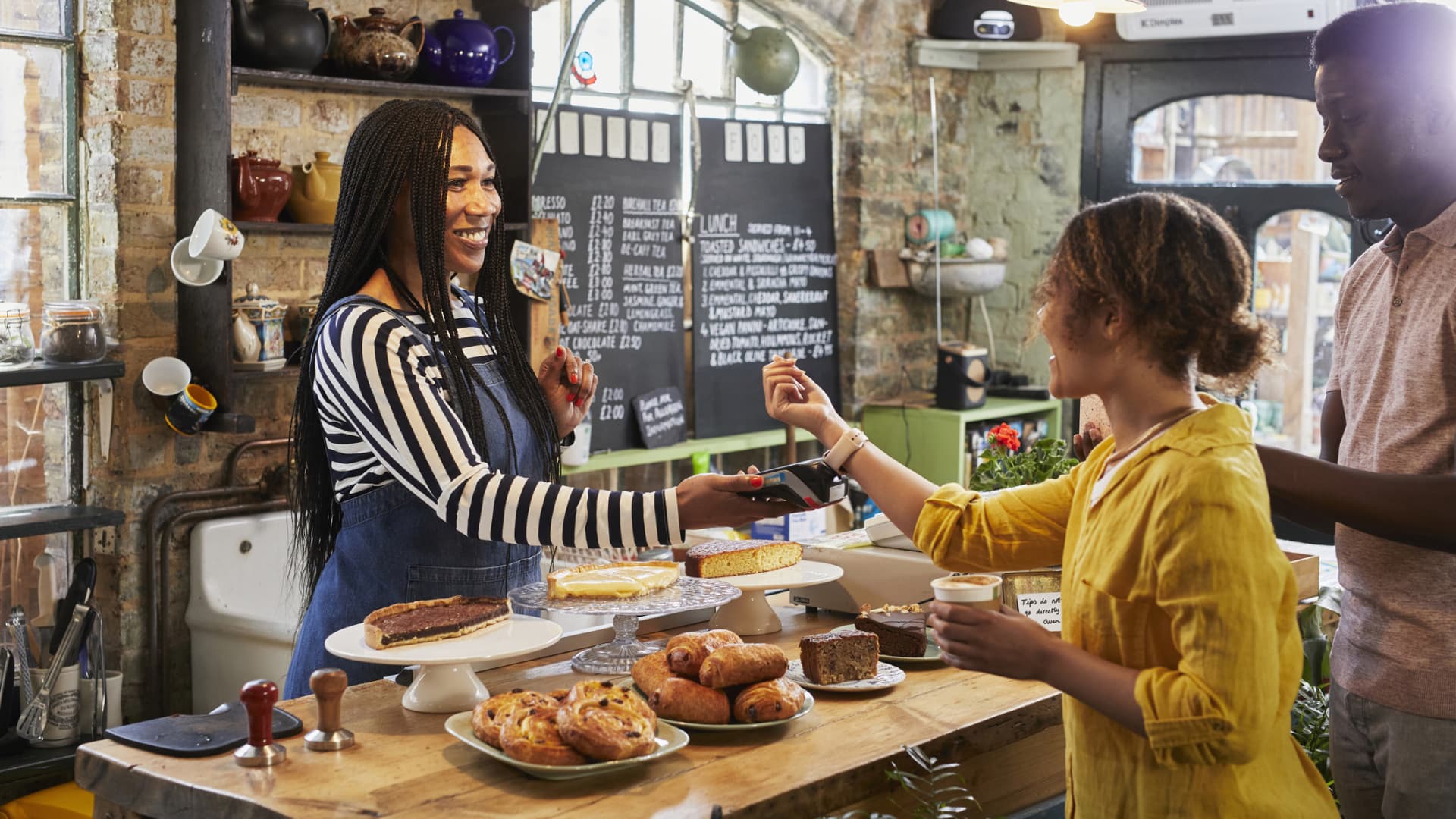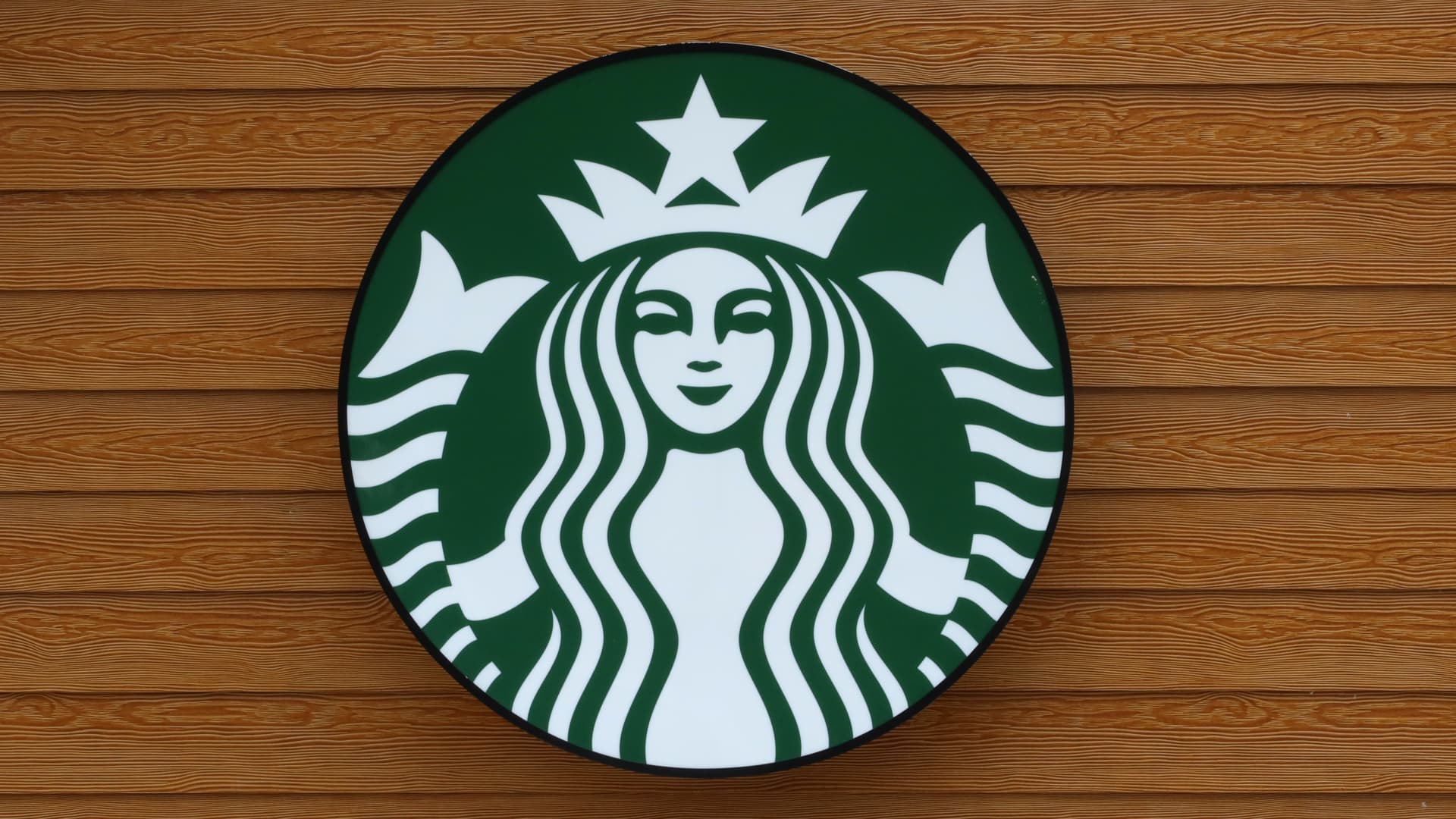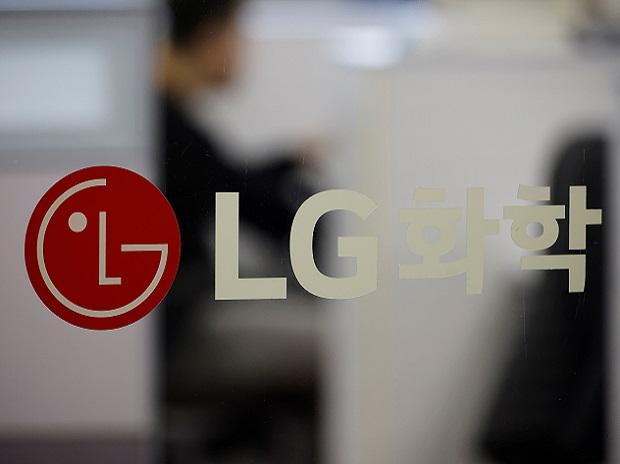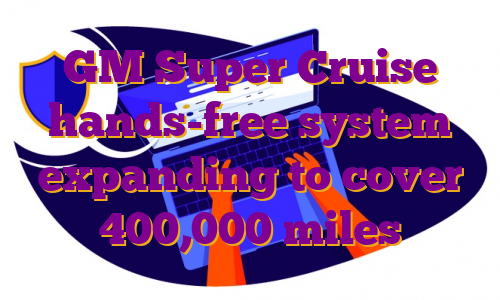Salvadoran President, Nayib Bukele speaks during an event in May 2021. El Salvador become the first country to adopt bitcoin as legal tender in June.Camilo Freedman | SOPA Images | LightRocket | Getty ImagesIt has been more than a year since El Salvador made history by becoming the first country to make bitcoin legal tender, and so far, 37-year-old resident Edgardo Acevedo has found the nationwide crypto experiment to be relatively anticlimactic.”I don’t think anything has changed, except that the country is more recognized than before, but the economic life of Salvadorans remains the same or worse than a few years ago,” said Acevedo, a development engineer working in the capital city of San Salvador.Acevedo, who is also known by the pseudonym Ishi Kawa, tells CNBC that while bitcoin has become a topic of conversation, adoption remains low, and he has personally found that there are very few businesses that accept the world’s biggest cryptocurrency — and even fewer Salvadorans who wish to pay in the digital token.”What has improved is the issue of violence and crime, but economically, I can say that nothing has changed,” he said.It has been a rocky time, with the project not living up to the grand promises made by the country’s popular and outspoken president Nayib Bukele.The use of bitcoin in El Salvador appears to be low, as the currency has lost about 60% of its value since the experiment started and the country still faces plummeting economic growth and a high deficit. El Salvador’s debt-to-GDP ratio — a key metric used to compare what a country owes with what it generates — is set to hit nearly 87% this year, stoking fears that the nation isn’t equipped to settle its loan obligations.Data from Bloomberg Economics shows that El Salvador tops its ranking of emerging market countries that are vulnerable to a debt default. Even as it retires some of its outstanding debts, the country’s domestic and multilateral loan obligations pose a real threat, in part because the world’s biggest lenders aren’t too keen to give cash to a country betting its future on one of the most volatile assets on the planet.Pair these economic woes with a renewed war on gang violence and the country is barreling toward uncertainty.”The government claims the developments as a success, but most local commentators and international watchers are underwhelmed,” Rachel Ziemba, founder of Ziemba Insights, told CNBC.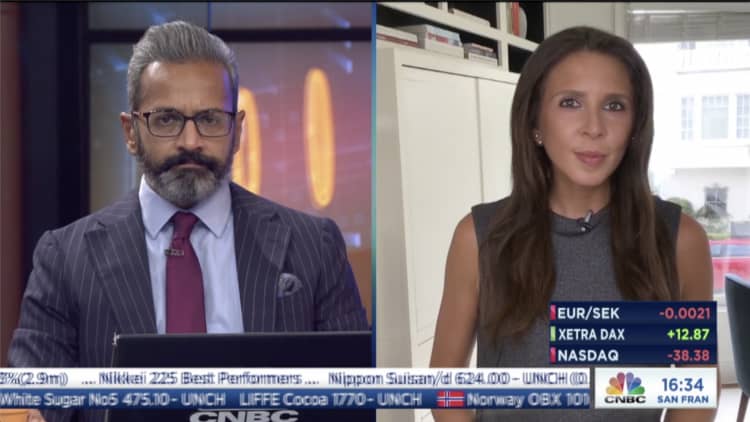 Bitcoin uptake appears lowWhen El Salvador’s Bitcoin Law came into effect Sept. 7, 2021, Jaime Garcia was hopeful that it would fix a few big problems with the way that Salvadorans send, receive and spend money.As part of the law, prices are now sometimes listed in bitcoin, tax contributions can be paid with the digital currency, and exchanges in bitcoin will not be subject to capital gains tax. But crucially, Bukele promoted the law as a way to expand financial inclusion — which is no small thing for a country where approximately 70% of the population does not have access to traditional financial services, according to the Bitcoin Law.To help facilitate national adoption, El Salvador launched a virtual wallet called “chivo” (Salvadoran slang for “cool”) that offers no-fee transactions, allows for quick cross-border payments, and requires only a mobile phone plus an internet connection. It aimed to bring users onboard quickly, both to scale bitcoin adoption and to offer a convenient onramp for those who had never been a part of the banking system.Bukele tweeted in January that about 60% of the population, or 4 million people, used the chivo app, and more Salvadorans have chivo wallets than traditional bank accounts, according to a Sept. 20 research note from Deutsche Bank. Still, only 64.6% of the country has access to a mobile phone with internet, that note says.But a report published in April by the U.S. National Bureau of Economic Research showed that only 20% of those who downloaded the wallet continued to use it after spending the $30 bonus. The research was based upon a “nationally representative survey” involving 1,800 households.Garcia, who lives in the Canadian province of Saskatchewan, fled El Salvador when he was 11 after rebels bombed his house, but he keeps in close touch with family and friends who stayed behind — and he sometimes sends money back home, too.”There are pockets where bitcoin is popular, like in El Zonte, but it’s clear that adoption is not massive,” said Garcia.”Big chains like McDonald’s, Starbucks, and most merchants at a mall will accept bitcoin — but are people using it? Not too much locally,” he said. “It’s mostly tourists using bitcoin.”A survey by the El Salvador-based El Instituto de Opinion Publica, a public opinion think tank, found that 7 in 10 Salvadorans do not think the Bitcoin Law has benefited their family economy.Another survey by the institute found that 76 out of 100 small and medium-size enterprises in El Salvador do not accept bitcoin payments.”Bitcoin’s first year in effect has transcended from a commercial expectation to an irrelevant topic for traders,” said Laura Andrade, director of El Salvador’s Universidad Centroamericana, according to a CNBC translation of her Spanish-language comments.Andrade said many large corporations are still advertising that they’re taking payments in bitcoin but are making excuses to not accept the cryptocurrency including saying their system does not work or the bitcoin wallet is out of service.”The foregoing is evidence that this cryptocurrency, in reality, never had penetration in national commerce,” Andrade said.”There seems to be evidence that most people used it primarily to get the free money from the government but have not used it on an ongoing basis given volatility and fees,” Ziemba said.Meanwhile, those who did use the government’s crypto wallet reportedly had technical problems with the app. Other Salvadorans fell prey to schemes involving identity theft, in which hackers used their national ID number to open a chivo e-wallet, in order to claim the free $30 worth of bitcoin offered by the government as an incentive to join.A survey published in March by the Chamber of Commerce and Industry of El Salvador found that 86% of businesses have never made a sale in bitcoin, and only 20% of businesses take bitcoin, despite the Law’s mandate that all merchants accept the cryptocurrency.”They gave people the wallets, they forced businesses to accept them, but essentially, in my opinion, it’s a big nothing burger,” said Frank Muci, a policy fellow at the London School of Economics, who has experience advising governments in Latin America. “Nobody really uses the app to pay in bitcoin. People that do use it, mostly use it for dollars.”The experiment also involved building a nationwide infrastructure of bitcoin ATMs, but they’re too far away for many people to use.Another hope for the chivo wallet was that it would help save hundreds of millions of dollars in remittance fees. Remittances, or money sent home by migrants, account for more than 20% of El Salvador’s gross domestic product, and some households receive over 60% of their income from this source alone. Incumbent services can charge 10% or more in fees for those international transfers, which can sometimes take days to arrive and require a physical pickup.But in 2022, recent data shows that only 1.6% of remittances were sent to El Salvador via digital wallets. According to the Deutsche Bank report from September, part of the reason bitcoin transfers haven’t caught on has to do with the complications of buying and selling bitcoin for dollars. The report notes that “people who send and receive remittances frequently use informal brokers to convert local currency to and from bitcoin” and extremely volatile prices make buying and selling the cryptocurrency a complex task requiring technical know-how.”This is a new money, a new way of doing things for a population that is very comfortable with dollars. This is a population that is largely unbanked and would rather deal with hard cash that they can see and feel,” Garcia said.Miles Suter, the crypto product lead at Cash App, told CNBC on a panel at the Messari Mainnet conference in New York that the government’s 90-day rollout of the chivo wallet and nationwide adoption of bitcoin was “rushed” and that there are still a lot of problems.”You shouldn’t mandate the acceptance of a specific currency,” said Suter, who spent six months in El Salvador in the runup to the passing of the Bitcoin Law. However, Suter added that the media perception is worse than how things are actually going on the ground.”I saw and experienced lives being changed by having access to a new emerging monetary standard,” he said.
Bitcoin uptake appears lowWhen El Salvador’s Bitcoin Law came into effect Sept. 7, 2021, Jaime Garcia was hopeful that it would fix a few big problems with the way that Salvadorans send, receive and spend money.As part of the law, prices are now sometimes listed in bitcoin, tax contributions can be paid with the digital currency, and exchanges in bitcoin will not be subject to capital gains tax. But crucially, Bukele promoted the law as a way to expand financial inclusion — which is no small thing for a country where approximately 70% of the population does not have access to traditional financial services, according to the Bitcoin Law.To help facilitate national adoption, El Salvador launched a virtual wallet called “chivo” (Salvadoran slang for “cool”) that offers no-fee transactions, allows for quick cross-border payments, and requires only a mobile phone plus an internet connection. It aimed to bring users onboard quickly, both to scale bitcoin adoption and to offer a convenient onramp for those who had never been a part of the banking system.Bukele tweeted in January that about 60% of the population, or 4 million people, used the chivo app, and more Salvadorans have chivo wallets than traditional bank accounts, according to a Sept. 20 research note from Deutsche Bank. Still, only 64.6% of the country has access to a mobile phone with internet, that note says.But a report published in April by the U.S. National Bureau of Economic Research showed that only 20% of those who downloaded the wallet continued to use it after spending the $30 bonus. The research was based upon a “nationally representative survey” involving 1,800 households.Garcia, who lives in the Canadian province of Saskatchewan, fled El Salvador when he was 11 after rebels bombed his house, but he keeps in close touch with family and friends who stayed behind — and he sometimes sends money back home, too.”There are pockets where bitcoin is popular, like in El Zonte, but it’s clear that adoption is not massive,” said Garcia.”Big chains like McDonald’s, Starbucks, and most merchants at a mall will accept bitcoin — but are people using it? Not too much locally,” he said. “It’s mostly tourists using bitcoin.”A survey by the El Salvador-based El Instituto de Opinion Publica, a public opinion think tank, found that 7 in 10 Salvadorans do not think the Bitcoin Law has benefited their family economy.Another survey by the institute found that 76 out of 100 small and medium-size enterprises in El Salvador do not accept bitcoin payments.”Bitcoin’s first year in effect has transcended from a commercial expectation to an irrelevant topic for traders,” said Laura Andrade, director of El Salvador’s Universidad Centroamericana, according to a CNBC translation of her Spanish-language comments.Andrade said many large corporations are still advertising that they’re taking payments in bitcoin but are making excuses to not accept the cryptocurrency including saying their system does not work or the bitcoin wallet is out of service.”The foregoing is evidence that this cryptocurrency, in reality, never had penetration in national commerce,” Andrade said.”There seems to be evidence that most people used it primarily to get the free money from the government but have not used it on an ongoing basis given volatility and fees,” Ziemba said.Meanwhile, those who did use the government’s crypto wallet reportedly had technical problems with the app. Other Salvadorans fell prey to schemes involving identity theft, in which hackers used their national ID number to open a chivo e-wallet, in order to claim the free $30 worth of bitcoin offered by the government as an incentive to join.A survey published in March by the Chamber of Commerce and Industry of El Salvador found that 86% of businesses have never made a sale in bitcoin, and only 20% of businesses take bitcoin, despite the Law’s mandate that all merchants accept the cryptocurrency.”They gave people the wallets, they forced businesses to accept them, but essentially, in my opinion, it’s a big nothing burger,” said Frank Muci, a policy fellow at the London School of Economics, who has experience advising governments in Latin America. “Nobody really uses the app to pay in bitcoin. People that do use it, mostly use it for dollars.”The experiment also involved building a nationwide infrastructure of bitcoin ATMs, but they’re too far away for many people to use.Another hope for the chivo wallet was that it would help save hundreds of millions of dollars in remittance fees. Remittances, or money sent home by migrants, account for more than 20% of El Salvador’s gross domestic product, and some households receive over 60% of their income from this source alone. Incumbent services can charge 10% or more in fees for those international transfers, which can sometimes take days to arrive and require a physical pickup.But in 2022, recent data shows that only 1.6% of remittances were sent to El Salvador via digital wallets. According to the Deutsche Bank report from September, part of the reason bitcoin transfers haven’t caught on has to do with the complications of buying and selling bitcoin for dollars. The report notes that “people who send and receive remittances frequently use informal brokers to convert local currency to and from bitcoin” and extremely volatile prices make buying and selling the cryptocurrency a complex task requiring technical know-how.”This is a new money, a new way of doing things for a population that is very comfortable with dollars. This is a population that is largely unbanked and would rather deal with hard cash that they can see and feel,” Garcia said.Miles Suter, the crypto product lead at Cash App, told CNBC on a panel at the Messari Mainnet conference in New York that the government’s 90-day rollout of the chivo wallet and nationwide adoption of bitcoin was “rushed” and that there are still a lot of problems.”You shouldn’t mandate the acceptance of a specific currency,” said Suter, who spent six months in El Salvador in the runup to the passing of the Bitcoin Law. However, Suter added that the media perception is worse than how things are actually going on the ground.”I saw and experienced lives being changed by having access to a new emerging monetary standard,” he said.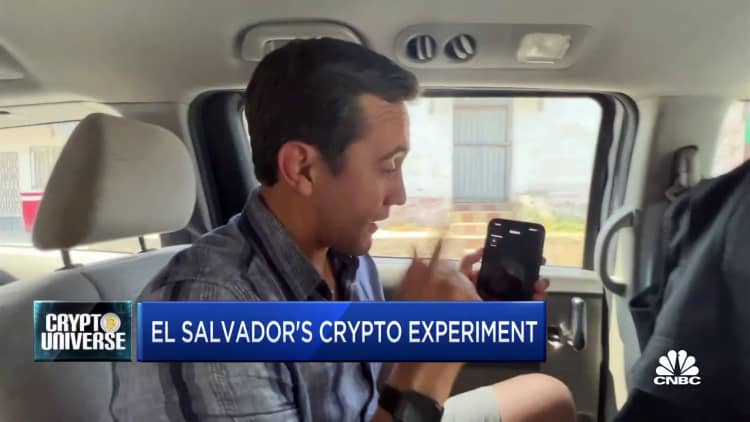 ‘Sleepwalking into a debt default’Well before Bukele wagered that bitcoin would bandage over longstanding economic vulnerabilities, the country was in a lot of trouble.The World Bank projects that the Salvadoran economy will grow by 2.9% this year and 1.9% in 2023, down from 10.7% in 2021. But that growth itself was a bounce-back from an 8.6% contraction in 2020.Its debt-to-GDP ratio is almost 90%, and its debt is expensive at around 5% per year versus 1.5% in the U.S. The country also has a massive deficit — with no plans to reduce it, whether through tax hikes or by substantially cutting spending.In a research note from JPMorgan, analysts warn that El Salvador’s eurobonds have entered “distressed territory” in the last year, and S&P Global data reportedly shows that the cost to insure against a sovereign debt default is hitting multiyear highs.Both JPMorgan and the International Monetary Fund warn the country is on an unsustainable path, with gross financing needs set to surpass 15% of GDP from 2022 forward — and public debt on track to hit 96% of GDP by 2026 under current policies.El Salvador faces a heavy mix of multilateral and domestic debts, including imminent debt repayment deadlines in the billions of dollars, such as an $800 million eurobond that matures in January.”The domestic debt is very large, relatively short duration and needs to be rolled over frequently,” said Muci, who previously worked at the Growth Lab at the Harvard Kennedy School of Government.El Salvador has been trying since early 2021 to secure a $1.3 billion loan from the IMF — an effort that appears to have soured over Bukele’s refusal to heed the organization’s advice to ditch bitcoin as legal tender.Rating agencies, including Fitch, have knocked down El Salvador’s credit score, citing the uncertainty of the country’s financial future given the adoption of bitcoin as legal tender. That means that it’s now even more expensive for Bukele to borrow much-needed cash.Beyond the fact that global lenders don’t want to throw money at a country that is spending millions in tax dollars on a cryptocurrency whose price is prone to extreme volatility, the IMF’s largest shareholder, the U.S., is targeting Salvadoran officials as part of wider international sanctions against “corrupt actors.”The president’s efforts to consolidate power have also driven up this risk premium for global lenders.Bukele’s New Ideas party has control over the country’s Legislative Assembly. In 2021, the new assembly came under fire after it ousted the attorney general and top judges. The move prompted the U.S. Agency for International Development to pull aid from El Salvador’s national police and a public information institute and reroute the funds to civil society groups.Additionally, El Salvador can’t print cash to shore up its finances. El Salvador ditched its local currency, the colon, in favor of the U.S. dollar. Only the Federal Reserve can print more dollars. Meanwhile, its other national currency, bitcoin, is revered for the fact that it, too, is impossible to mint out of thin air.”One of the big issues has been the fact that the bitcoin gimmick has distracted from the fiscal and economic challenges of the country and made it more difficult for the country to access IFI lending and preferential terms,” Ziemba said.Ziemba added that there have been some swaps with major crypto firms that allowed the country to raise cash to pay off the debt due this year, and perhaps early next year, but the long-term debt sustainability remains a challenge.”They’ve spooked the bejesus out of financial markets and the IMF,” said Muci, who tells CNBC that nobody wants to lend money to Bukele unless it’s at “eye-gouging rates” of 20% to 25%.”The country is sleepwalking into a debt default,” Muci said.
‘Sleepwalking into a debt default’Well before Bukele wagered that bitcoin would bandage over longstanding economic vulnerabilities, the country was in a lot of trouble.The World Bank projects that the Salvadoran economy will grow by 2.9% this year and 1.9% in 2023, down from 10.7% in 2021. But that growth itself was a bounce-back from an 8.6% contraction in 2020.Its debt-to-GDP ratio is almost 90%, and its debt is expensive at around 5% per year versus 1.5% in the U.S. The country also has a massive deficit — with no plans to reduce it, whether through tax hikes or by substantially cutting spending.In a research note from JPMorgan, analysts warn that El Salvador’s eurobonds have entered “distressed territory” in the last year, and S&P Global data reportedly shows that the cost to insure against a sovereign debt default is hitting multiyear highs.Both JPMorgan and the International Monetary Fund warn the country is on an unsustainable path, with gross financing needs set to surpass 15% of GDP from 2022 forward — and public debt on track to hit 96% of GDP by 2026 under current policies.El Salvador faces a heavy mix of multilateral and domestic debts, including imminent debt repayment deadlines in the billions of dollars, such as an $800 million eurobond that matures in January.”The domestic debt is very large, relatively short duration and needs to be rolled over frequently,” said Muci, who previously worked at the Growth Lab at the Harvard Kennedy School of Government.El Salvador has been trying since early 2021 to secure a $1.3 billion loan from the IMF — an effort that appears to have soured over Bukele’s refusal to heed the organization’s advice to ditch bitcoin as legal tender.Rating agencies, including Fitch, have knocked down El Salvador’s credit score, citing the uncertainty of the country’s financial future given the adoption of bitcoin as legal tender. That means that it’s now even more expensive for Bukele to borrow much-needed cash.Beyond the fact that global lenders don’t want to throw money at a country that is spending millions in tax dollars on a cryptocurrency whose price is prone to extreme volatility, the IMF’s largest shareholder, the U.S., is targeting Salvadoran officials as part of wider international sanctions against “corrupt actors.”The president’s efforts to consolidate power have also driven up this risk premium for global lenders.Bukele’s New Ideas party has control over the country’s Legislative Assembly. In 2021, the new assembly came under fire after it ousted the attorney general and top judges. The move prompted the U.S. Agency for International Development to pull aid from El Salvador’s national police and a public information institute and reroute the funds to civil society groups.Additionally, El Salvador can’t print cash to shore up its finances. El Salvador ditched its local currency, the colon, in favor of the U.S. dollar. Only the Federal Reserve can print more dollars. Meanwhile, its other national currency, bitcoin, is revered for the fact that it, too, is impossible to mint out of thin air.”One of the big issues has been the fact that the bitcoin gimmick has distracted from the fiscal and economic challenges of the country and made it more difficult for the country to access IFI lending and preferential terms,” Ziemba said.Ziemba added that there have been some swaps with major crypto firms that allowed the country to raise cash to pay off the debt due this year, and perhaps early next year, but the long-term debt sustainability remains a challenge.”They’ve spooked the bejesus out of financial markets and the IMF,” said Muci, who tells CNBC that nobody wants to lend money to Bukele unless it’s at “eye-gouging rates” of 20% to 25%.”The country is sleepwalking into a debt default,” Muci said.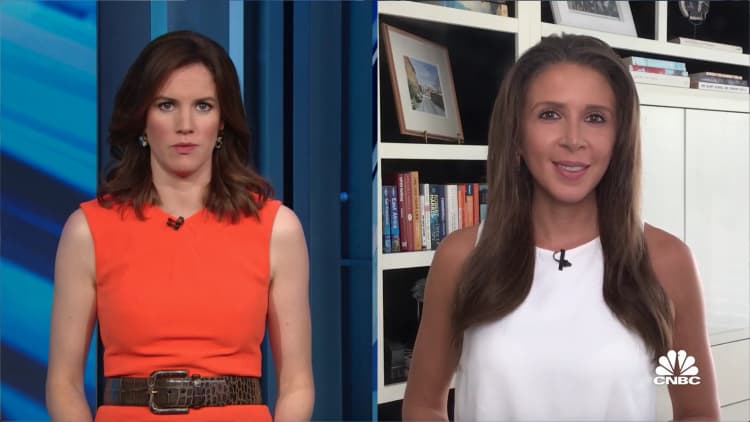 Tourism and presidential popularity solidOn the day the Bitcoin Law took effect, Bukele revealed that the country had begun to add bitcoin to government coffers. Since then, the price of the cryptocurrency has plunged more than 60%, stoked by rising interest rates and failed projects and bankruptcies in the industry.The government has an unrealized paper loss on bitcoin of around $60 million. None of these losses are locked in until the country exits its bitcoin position.In aggregate, the entire experiment and all its associated costs have only set the government back around $375 million, according to estimates. That’s not nothing — especially considering the fact that El Salvador has $7.7 billion of bonds outstanding — but to an economy of $29 billion, it is comparatively small.El Salvador’s millennial, tech-savvy president — who once touted himself as the “world’s coolest dictator” on his Twitter bio — has tethered his political fate to the country’s crypto gamble, so he has a very big incentive to make it work in the long run and to pay off the country’s debt in the interim. Bukele faces reelection for another five-year presidential term in 2024.At least El Salvador’s big bitcoin gamble has been a win in terms of attracting bitcoin tourists.The tourism industry is up 30% since the Bitcoin Law took effect, according to official government estimates. The country’s tourism minister also notes that 60% of tourists now come from the U.S.The bitcoin experiment hasn’t hurt the president’s popularity either. Bukele’s approval ratings are north of 85% — thanks in large part to his tough-on-crime approach to leading. That’s no small thing to a country that was more dangerous per capita than Afghanistan five years ago.Suter said the project has also introduced many locals to the concept of savings, noting that before the Bitcoin Law, much of the population didn’t have a way to digitally hold their money and transact among one another.”It was all cash — and the cash that you earned that week, you typically spent it, because there wasn’t much ability to dream of growing it through investment.”
Tourism and presidential popularity solidOn the day the Bitcoin Law took effect, Bukele revealed that the country had begun to add bitcoin to government coffers. Since then, the price of the cryptocurrency has plunged more than 60%, stoked by rising interest rates and failed projects and bankruptcies in the industry.The government has an unrealized paper loss on bitcoin of around $60 million. None of these losses are locked in until the country exits its bitcoin position.In aggregate, the entire experiment and all its associated costs have only set the government back around $375 million, according to estimates. That’s not nothing — especially considering the fact that El Salvador has $7.7 billion of bonds outstanding — but to an economy of $29 billion, it is comparatively small.El Salvador’s millennial, tech-savvy president — who once touted himself as the “world’s coolest dictator” on his Twitter bio — has tethered his political fate to the country’s crypto gamble, so he has a very big incentive to make it work in the long run and to pay off the country’s debt in the interim. Bukele faces reelection for another five-year presidential term in 2024.At least El Salvador’s big bitcoin gamble has been a win in terms of attracting bitcoin tourists.The tourism industry is up 30% since the Bitcoin Law took effect, according to official government estimates. The country’s tourism minister also notes that 60% of tourists now come from the U.S.The bitcoin experiment hasn’t hurt the president’s popularity either. Bukele’s approval ratings are north of 85% — thanks in large part to his tough-on-crime approach to leading. That’s no small thing to a country that was more dangerous per capita than Afghanistan five years ago.Suter said the project has also introduced many locals to the concept of savings, noting that before the Bitcoin Law, much of the population didn’t have a way to digitally hold their money and transact among one another.”It was all cash — and the cash that you earned that week, you typically spent it, because there wasn’t much ability to dream of growing it through investment.”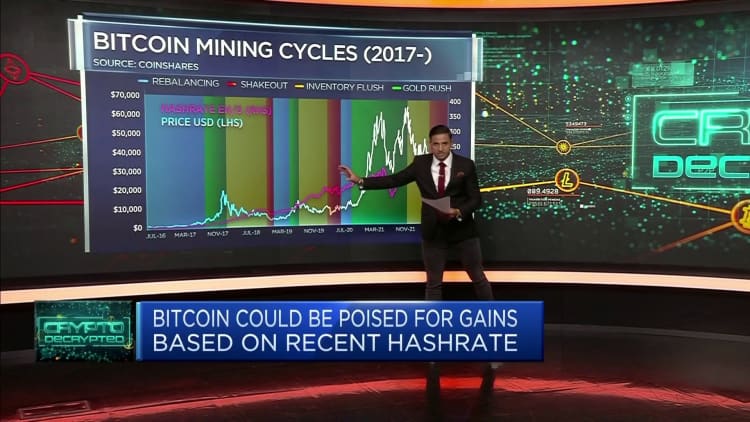 The president upped the ante in November when he announced plans to build a “Bitcoin City” next door to the Conchagua volcano in southeastern El Salvador. The bitcoin-funded city would offer significant tax relief, and geothermal energy rolling off the adjacent volcano would power bitcoin miners.But now, Bitcoin City is on hold, as is the $1 billion bitcoin bond sale, which was initially put on ice in March because of unfavorable market conditions.”Ultimately, El Salvador’s problems are just tangential to currency,” Muci said.”The plane is gonna crash eventually, if they don’t change things,” he said — “if they don’t raise taxes, cut spending, start being much more disciplined, convincing markets that they’re sustainable.””Bitcoin doesn’t solve any of El Salvador’s important economic problems,” he added.
The president upped the ante in November when he announced plans to build a “Bitcoin City” next door to the Conchagua volcano in southeastern El Salvador. The bitcoin-funded city would offer significant tax relief, and geothermal energy rolling off the adjacent volcano would power bitcoin miners.But now, Bitcoin City is on hold, as is the $1 billion bitcoin bond sale, which was initially put on ice in March because of unfavorable market conditions.”Ultimately, El Salvador’s problems are just tangential to currency,” Muci said.”The plane is gonna crash eventually, if they don’t change things,” he said — “if they don’t raise taxes, cut spending, start being much more disciplined, convincing markets that they’re sustainable.””Bitcoin doesn’t solve any of El Salvador’s important economic problems,” he added.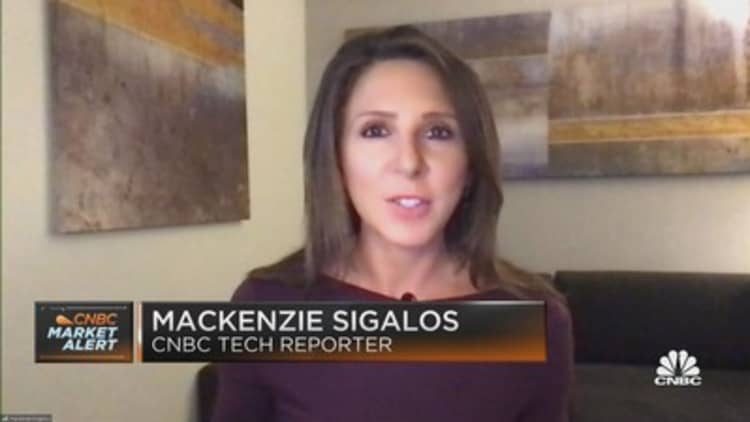 .
.
American Express Cardholders Get Free Drinks at Panera Bread
Terms apply to American Express benefits and offers. Visit americanexpress.com to learn more.Thanks to a renewed partnership with Panera Bread, American Express cardholders again have the opportunity to score free beverages at the popular chain restaurant, which has more than 2,100 locations across the U.S. and is known for its bakery items, sandwiches and soups.Now through Dec. 31, 2022, American Express cardholders who register for this offer will receive a complimentary four-month subscription to Panera’s Unlimited Sip Club, which offers unlimited coffee, tea, lemonade and other drinks for $11.99 per month.Below, Select takes a closer look at the promotion and how American Express cardholders can take advantage of it.Subscribe to the Select Newsletter!Our best selections in your inbox. Shopping recommendations that help upgrade your life, delivered weekly. Sign-up here.Who is eligible and how to sign upThe Platinum Card® from American ExpressOn the American Express secure site
- RewardsEarn 5X Membership Rewards® Points for flights booked directly with airlines or with American Express Travel up to $500,000 on these purchases per calendar year, 5X Membership Rewards® Points on prepaid hotels booked with American Express Travel, 1X points on all other eligible purchases
- Welcome bonusEarn 100,000 Membership Rewards® points after spending $6,000 within 6 months of card membership. Apply and select your preferred metal Card design: classic Platinum Card®, Platinum x Kehinde Wiley, or Platinum x Julie Mehretu.
- Annual fee
- Intro APR
- Regular APR
- Balance transfer fee
- Foreign transaction fee
- Credit Needed
Blue Cash Everyday® Card from American ExpressOn the American Express secure site
- Rewards3% cash back at U.S. supermarkets (up to $6,000 per year in purchases, then 1%), 3% cash back at U.S. gas stations, (up to $6,000 per year, then 1%), 3% cash back on U.S. online retail purchases, on up to $6,000 per year, then 1%. Cash back is received in the form of Reward Dollars that can be easily redeemed for statement credits.
- Welcome bonusEarn a $200 statement credit after you spend $2,000 in purchases on your new card within the first 6 months.
- Annual fee
- Intro APR0% for 15 months on purchases and balance transfers, from the date of account opening
- Regular APR
- Balance transfer feeEither $5 or 3% of the amount of each transfer, whichever is greater.
- Foreign transaction fee
- Credit needed
To redeem the offer online, follow these steps to sign up before Dec. 31, 2022:
- Redeem the offer through this link
- Login on the American Express website to confirm your account
- Make sure you have a MyPanera account and sign up for a Panera Unlimited Sip Club subscription through Panera Bread’s website
Once your sign-up is complete, the complimentary four-month trial will begin. When that ends, you’ll automatically be charged the current rate ($11.99 plus tax per month at the time of publication) for a subscription unless you choose to cancel it sooner.Those who are not American Express cardholders can still score free access to Panera’s Unlimited Sip Club through a different promotion. New subscribers who sign up for a membership by Nov. 9, 2022, get their first month free, with the option of canceling the subscription at any time before being charged the regular monthly rate.Panera Unlimited Sip Club benefitsUnlimited Sip Club subscribers have access to a variety of free drinks, including drip hot coffee, iced and hot tea and coffee, fountain soda beverages, hot tea, bubbler drinks, and Charged Lemonades — and can get one for free once every two hours, as well as enjoy unlimited refills while you’re in a Panera Bread location. Even better, you can order any size.Note that this offer does exclude other beverages such as smoothies, bottled drinks, cold brew iced coffee, espresso and cappuccino beverages and frozen blended beverages, as well as beverage enhancements such as espresso and syrups including Madagascar vanilla, caramel, cinnamon and bittersweet chocolate.Bottom lineIf you live near a Panera Bread location, have an American Express card, and haven’t already joined Panera’s Unlimited Sip Club, this offer provides an easy way to score some free beverages this fall — just make sure you’ve signed up for it before December 31, 2022.To avoid being charged at the end of the fourth-month subscription, set a reminder in your calendar to cancel before the trial period is up. There are also a number of subscription trackers like Rocket Money and Trim that make it easy to keep tabs on your subscriptions.Catch up on Select’s in-depth coverage of personal finance, tech and tools, wellness and more, and follow us on Facebook, Instagram and Twitter to stay up to date.For rates and fees for The Blue Cash Everyday® Card from American Express, click here.For rates and fees of The Platinum Card® from American Express, click here.Editorial Note: Opinions, analyses, reviews or recommendations expressed in this article are those of the Select editorial staff’s alone, and have not been reviewed, approved or otherwise endorsed by any third party. .
Premium products take priority as companies battle cost-of-living
“As we create more premium beverages, it becomes more difficult for customers to replicate it at home and we think that helps with the concept of trade down,” Starbucks CFO Rachel Ruggeri told CNBC’s “Squawk Box” on Aug. 3.Gary Hershorn / Contributor / Getty ImagesPersonalized coffees, “prestige” skincare and “elevated” sauces and spreads are just some examples of how companies like Starbucks, Unilever and Kraft Heinz are tilting their focus toward premium products — and consumers appear to be loving it.But why are companies zooming in on their pricier offerings when consumers are feeling the effects of the biggest inflation shock in decades?related investing news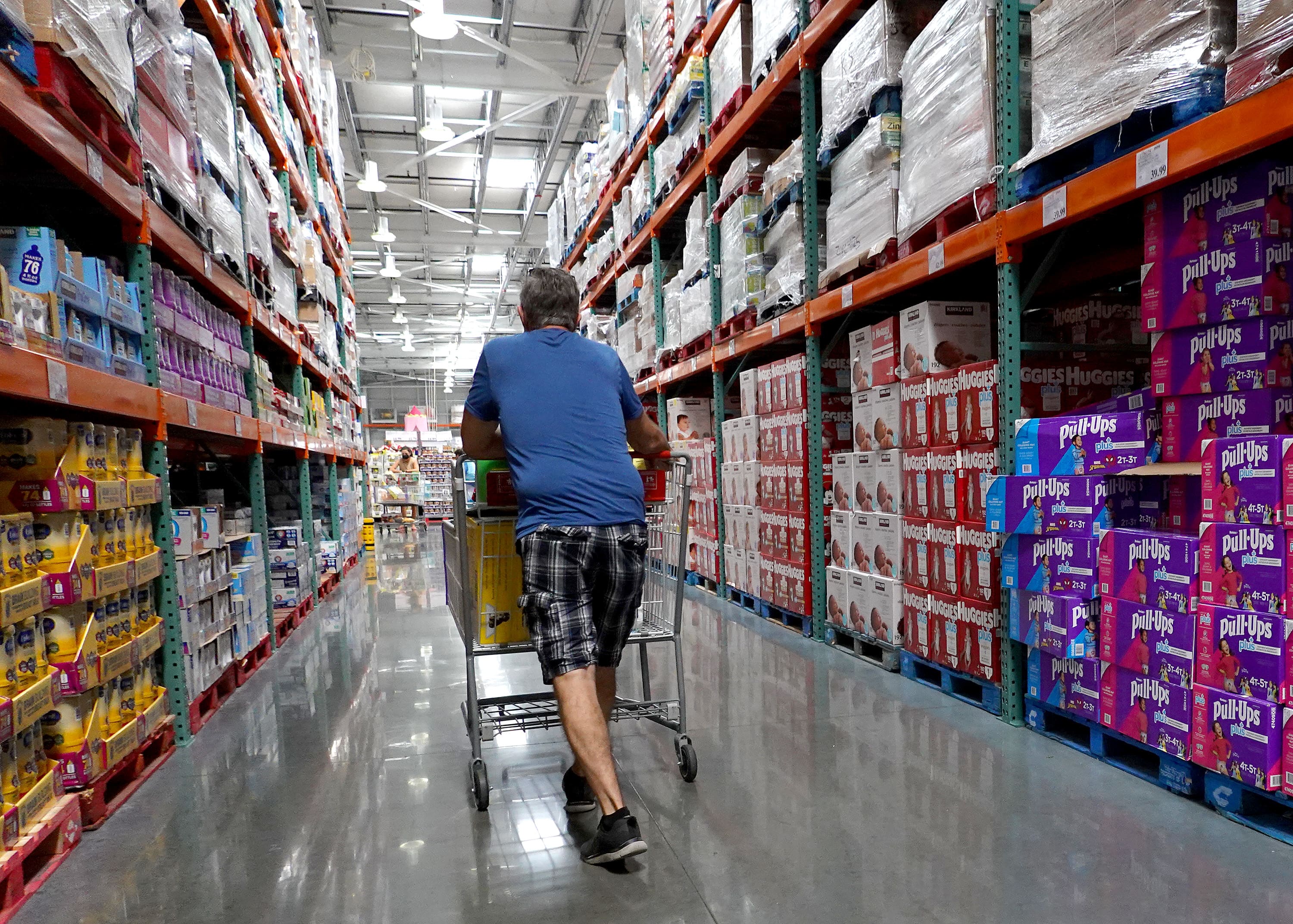
What to expect when Costco reports earnings after the closing bell Thursday”Customer insight is key for consumer businesses as the cost of living squeeze tightens,” Paul Martin, KPMG’s U.K. Head of Retail, told CNBC.”Whilst it’s true that some consumers are having to increasingly turn to value products and watch every penny, it is also the case that other consumers are nervous about the economic outlook but still have money to spend and are in essence trading down to premium products,” Martin said.”For example, swapping meals out for premium meals in. Whilst this group will also look to save money via the value essentials, they won’t be filling the basket solely with them,” he said.’An offering that’s worth paying for’Starbucks reported record customer counts and sales in the last quarter, beating Wall Street expectations. The results appear to reaffirm the view that some customers aren’t trading down or reducing their spending despite the increasing cost of living.Designing bespoke products is key to upping customer engagement even when money is tight, Starbucks CFO Rachel Ruggeri told CNBC’s “Squawk Box” on Aug. 3.”As we create more premium beverages, that’s more difficult for customers to replicate at home and we think that helps with the concept of trade down,” Ruggeri said. “It may mean that maybe a customer doesn’t come as frequently, but we want to ensure that we have reasons for the customers to come into the stores and interact with us.”Giving customers more flexibility also helped to sell more expensive products and pass on higher costs, Ruggeri said. “We’ve been able to do that through our personalization, which is a choice, and what we’ve seen so far is our demand is strong. And that tells us that we have an offering that’s worth paying for,” she said.The focus on premium products isn’t unique to the largest coffee chain in the U.S.Kraft Heinz is getting in on the luxury market with the launch of its HEINZ 57 Collection in July. The “chef-inspired” condiments are “designed to add magic to the culinary experience,” according to the company.This came as the company lifted prices by more than 12% in response to higher transportation, labor and ingredients costs amid rising inflation.
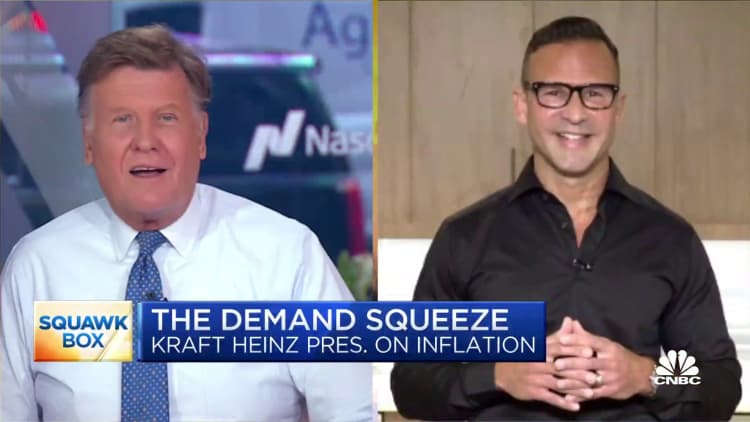 The introduction of more premium products is in addition to redesigns of classic products, according to the company’s U.S. president Carlos Abrams-Rivera.”One focus is how do we optimize formulas to bring in ingredients that are cheaper,” Abrams-Rivera told CNBC’s “Squawk Box” on July 28. “And how do we customize our products to the different consumers so they can access different products at different price points.”Treading a similar path is Mondelez. The company announced in June a deal to acquire organic-focused Clif Bar & Company, while all the company’s 2021 acquisitions — Hu Master Holdings, Lion/Gemstone Topco and Gourmet Food Holdings — were described as “premium” in its second-quarter earnings report.’Value faces a boom and so does premium’Unsurprisingly, consumers are also reliant on cheaper products, which companies are also sensitive to.McDonald’s, for example, attributed some of its growth in the U.S. to its value products in its Q2 2022 earnings report.Other companies are looking to attract both ends of the market by focusing on higher and lower-priced products.Nestle CEO Mark Schneider told investors in the company’s half-year results earnings call that the approach has been used before.”What we’re seeing with the current situation is similar to what happened in previous economic slowdowns and downturns,” Schneider said. “We pay attention to premium products but we also pay attention to affordable products. By covering both ends of this spectrum we’re doing well and we’re serving those needs.”Appealing to the widest possible customer base is key to maintaining and growing profits in the current economic climate, according to KPMG’s Martin.”In this landscape, value faces a boom and so does premium. Supermarkets recognize it, including the discounters, who are expanding their core value ranges, but also beefing up their premium proposition. Their aim is to capture and retain all of the trade-down audiences,” Martin said.Driving desirability and salesUnilever CEO Alan Jope told CNBC’s “Squawk Box” that the company was seeing a mixture of customers trading up and trading down.”The premium ranges in our portfolio are actually doing very well … We are seeing some downtrading – that’s on pack size, where people are moving to more affordable formats,” he said on July 26.In 2014, Unilever launched Prestige, a luxury arm of the conglomerate that now includes Dermalogica, Tatcha and Paula’s Choice.Described as “a string of pearls” by Executive VP and Group CEO Vasiliki Petrou in December, the model relies on “a certain level of scarcity” to drive desirability and sales.So far, it appears to have worked. Beauty & Personal Care grew 7.5% in the last quarter, driven by “strong growth” in Prestige Beauty and Health & Wellbeing, according to the company’s Q2 2022 results announcement.A focus on premium products can also be a more palatable means of tackling inflation costs compared to reducing items or packaging sizes, according to EY global consumer leader Kristina Rogers.”There is a limit to these actions and considering that input costs continue to rise, companies are looking at how to expand the value of their products,” Rogers told CNBC.”The only way to grow is therefore to go the premium and added value route. Companies need to demonstrate the added value of their brands and give consumers a good reason to buy higher-priced products,” Rogers said.”Companies are focusing on increasing the features of their product to extend consumers’ willingness to pay. These features include brand building, higher quality products, sustainability, or health features, to help validate a higher premium to be charged,” she added. .
The introduction of more premium products is in addition to redesigns of classic products, according to the company’s U.S. president Carlos Abrams-Rivera.”One focus is how do we optimize formulas to bring in ingredients that are cheaper,” Abrams-Rivera told CNBC’s “Squawk Box” on July 28. “And how do we customize our products to the different consumers so they can access different products at different price points.”Treading a similar path is Mondelez. The company announced in June a deal to acquire organic-focused Clif Bar & Company, while all the company’s 2021 acquisitions — Hu Master Holdings, Lion/Gemstone Topco and Gourmet Food Holdings — were described as “premium” in its second-quarter earnings report.’Value faces a boom and so does premium’Unsurprisingly, consumers are also reliant on cheaper products, which companies are also sensitive to.McDonald’s, for example, attributed some of its growth in the U.S. to its value products in its Q2 2022 earnings report.Other companies are looking to attract both ends of the market by focusing on higher and lower-priced products.Nestle CEO Mark Schneider told investors in the company’s half-year results earnings call that the approach has been used before.”What we’re seeing with the current situation is similar to what happened in previous economic slowdowns and downturns,” Schneider said. “We pay attention to premium products but we also pay attention to affordable products. By covering both ends of this spectrum we’re doing well and we’re serving those needs.”Appealing to the widest possible customer base is key to maintaining and growing profits in the current economic climate, according to KPMG’s Martin.”In this landscape, value faces a boom and so does premium. Supermarkets recognize it, including the discounters, who are expanding their core value ranges, but also beefing up their premium proposition. Their aim is to capture and retain all of the trade-down audiences,” Martin said.Driving desirability and salesUnilever CEO Alan Jope told CNBC’s “Squawk Box” that the company was seeing a mixture of customers trading up and trading down.”The premium ranges in our portfolio are actually doing very well … We are seeing some downtrading – that’s on pack size, where people are moving to more affordable formats,” he said on July 26.In 2014, Unilever launched Prestige, a luxury arm of the conglomerate that now includes Dermalogica, Tatcha and Paula’s Choice.Described as “a string of pearls” by Executive VP and Group CEO Vasiliki Petrou in December, the model relies on “a certain level of scarcity” to drive desirability and sales.So far, it appears to have worked. Beauty & Personal Care grew 7.5% in the last quarter, driven by “strong growth” in Prestige Beauty and Health & Wellbeing, according to the company’s Q2 2022 results announcement.A focus on premium products can also be a more palatable means of tackling inflation costs compared to reducing items or packaging sizes, according to EY global consumer leader Kristina Rogers.”There is a limit to these actions and considering that input costs continue to rise, companies are looking at how to expand the value of their products,” Rogers told CNBC.”The only way to grow is therefore to go the premium and added value route. Companies need to demonstrate the added value of their brands and give consumers a good reason to buy higher-priced products,” Rogers said.”Companies are focusing on increasing the features of their product to extend consumers’ willingness to pay. These features include brand building, higher quality products, sustainability, or health features, to help validate a higher premium to be charged,” she added. .
New LG platform Art Lab lets users buy, sell NFTs through its premium TVs
LG Electronics on Monday launched its very own non-fungible token (NFT) platform called LG Art Lab compatible with its premium TVs.
The new platform, available in the US on the company’s TVs running webOS 5.0 or later and accessible directly from the home screen, enables users to buy, sell and enjoy high-quality digital artwork.
“When displayed on the cinematic, 16:9 aspect ratio screens of LG’s TVs, NFTs come fully to life,” the company said in a statement.
LG’s new platform is based on the Hedera network — the enterprise-grade public ledger for the decentralised economy.
It makes buying and selling as simple as possible, incorporating onscreen QR codes that let users quickly complete transactions via Wallypto — the company’s crypto-currency wallet for smartphones, LG said in a statement.
Once purchased, an NFT can be traded on ‘LG Art Lab Marketplace’, where users can easily view transaction history, while in ‘My Collection’, they can admire all of their owned artworks.
The platform includes the ‘LG Art Lab Drops’ feature, which profiles artists and previews new works coming soon to the platform.
Meanwhile, the real-time Live Drops countdown ensures users never miss an opportunity to acquire a ajust dropped’ NFT.
LG Art Lab welcomed the first-ever digital artwork from well-known sculptor Barry X Ball.
Famous for reinterpreting classical and modernist sculptures using the latest 3D scanning and printing technologies, as well as traditional techniques, Barry X Ball is now making his exciting debut in the world of NFT art with unique ‘Metal’ series digital works.
–IANS
na/dpb(Only the headline and picture of this report may have been reworked by the Business Standard staff; the rest of the content is auto-generated from a syndicated feed.)
 Dear Reader,
Dear Reader,
Business Standard has always strived hard to provide up-to-date information and commentary on developments that are of interest to you and have wider political and economic implications for the country and the world. Your encouragement and constant feedback on how to improve our offering have only made our resolve and commitment to these ideals stronger. Even during these difficult times arising out of Covid-19, we continue to remain committed to keeping you informed and updated with credible news, authoritative views and incisive commentary on topical issues of relevance.
We, however, have a request.
As we battle the economic impact of the pandemic, we need your support even more, so that we can continue to offer you more quality content. Our subscription model has seen an encouraging response from many of you, who have subscribed to our online content. More subscription to our online content can only help us achieve the goals of offering you even better and more relevant content. We believe in free, fair and credible journalism. Your support through more subscriptions can help us practise the journalism to which we are committed.
Support quality journalism and subscribe to Business Standard.
Digital Editor
!function(f,b,e,v,n,t,s){if(f.fbq)return;n=f.fbq=function(){n.callMethod?n.callMethod.apply(n,arguments):n.queue.push(arguments)};if(!f._fbq)f._fbq=n;n.push=n;n.loaded=!0;n.version=’2.0′;n.queue=[];t=b.createElement(e);t.async=!0;t.src=v;s=b.getElementsByTagName(e)[0];s.parentNode.insertBefore(t,s)}(window,document,’script’,’https://connect.facebook.net/en_US/fbevents.js’);fbq(‘init’,’550264998751686′);fbq(‘track’,’PageView’); .
GM Super Cruise hands-free system expanding to cover 400,000 miles
That green light means you can take your hands off the wheel. Just keep your eyes on the road!Mack Hogan | CNBCDETROIT – General Motors is expanding its Super Cruise hands-free driving system in the U.S. and Canada later this year, introducing the feature for non-interstate roadways and highways such as Route 66 and the Pacific Coast Highway.With the additional roadways, the driver-assistance system will be usable across more than 400,000 miles of U.S. and Canadian roads, up from about 200,000 miles of strictly divided highway interstates.”These are the main roads that connect the smaller cities and the townships across the U.S. and Canada,” David Craig, GM’s mapping specialist, said during a media briefing. “This is expanding Super Cruise’s availability to many, many millions more customers.”Super Cruise uses a system of sensors and cameras to control steering, braking and acceleration functions of the car without the driver’s input. It also utilizes high-definition maps; a light bar to communicate with the driver; and an in-vehicle monitoring system to ensure drivers remain attentive while Super Cruise is operating.The feature, even with the update, won’t make turns on behalf of the driver or operate in cities, towns and residential streets, like some of Tesla’s driver-assist systems. Super Cruise will also hand control of the vehicle back to drivers if they are approaching an intersection with a stop sign or traffic light.Despite names like Super Cruise, or Tesla’s Autopilot and “Full Self-Driving” brands, these vehicles are not autonomous, or safe to use without a driver behind the wheel.GM said the newest roadways for Super Cruise will be available via over-the-air, or remote, updates, beginning in the fourth quarter of this year for most of its eligible vehicles. GM will not charge for the update, however the optional add-on currently starts at $2,200 or $2,500, depending on the vehicle.GM is expanding its Super Cruise hands-free driving system in the U.S. and Canada later this year to 400,000 miles of roadways,GMGM has slowly increased the availability and capabilities of Super Cruise since it was launched in 2017. It plans to offer Super Cruise on 23 models globally by the end of next year. It’s also announced a new system called “Ultra Cruise,” which GM has said will be capable of handling driving in 95% of scenarios.GM’s premium tier may make the company more directly competitive with Elon Musk-led electric vehicle maker Tesla. Driver-assistance systems from Tesla include the standard Autopilot, and premium option marketed as Full Self-Driving (or FSD), as well as, FSD Beta that lets drivers test out features on public roads before they go into widespread use.Driver-assistance systems have seen an increase in regulatory attention, specifically around accidents involving Tesla vehicles.Mario Maiorana, GM chief engineer of Super Cruise, said the company is in routine communication with the National Highway Traffic Safety Administration about the rollout of the additional roadways.”We’re not going to put it out until we’ve fully tested it,” Maiorana said, taking a slight jab at Tesla, which has been offering in-development “Beta” systems to some owners.GM’s Super Cruise hasn’t received as much attention or scrutiny as Tesla’s systems, partly due to additional safeguards and the company’s more conservative approach. GM has also only sold roughly 40,000 vehicles with Super Cruise, while Tesla offers some form of its systems on every vehicle it offers.As of the first week of July, NHTSA reported it had opened more than 30 probes since 2016 into collisions involving Tesla vehicles where driver-assistance systems like Autopilot were a suspected factor. The same report noted the federal vehicle watchdog was looking into two nonfatal incidents potentially involving Super Cruise.Tesla crashes under investigation as of the July report have resulted in 16 fatalities of vehicle occupants or pedestrians, according to the agency.Automakers are required by law to report fatal and other serious collisions involving driver-assistance systems to the NHTSA.– CNBC’s Lora Kolodny contributed to this report. .

